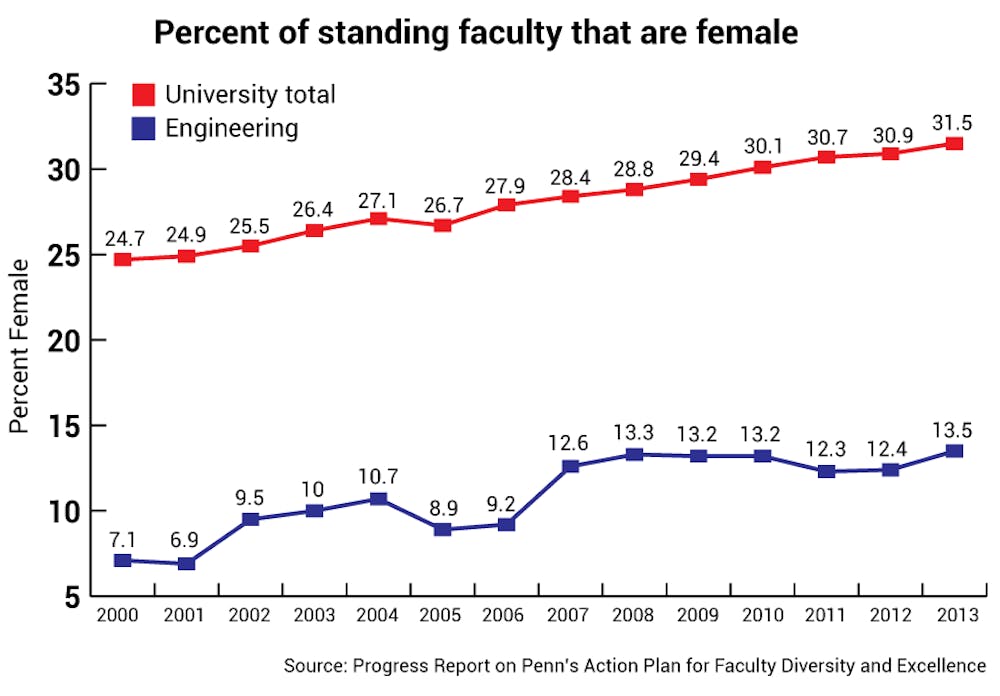“When I first was here I would get comments on my teaching like ‘Do you want to go on a date?’ or ‘You should grow your hair long’ or ‘I don’t like your outfits.’ It’s not relevant to the way I teach, but those are types of personal comments [I got],” recalled professor Susan Davidson of her early days on Penn’s faculty.
Davidson, a Weiss professor in the Computer and Information Science department of the Engineering School, laments that being a minority — a female faculty member among mostly males — has added obstacles to her academic career. “If you’re aggressive as a women you’re seen as nasty, [and] it is hard to be in control of a class and not be perceived as being aggressive,” Davidson said. She is one of the few women on the Engineering School’s faculty, which is around 13.5 percent female overall.
According to Davidson, there is a discrepancy in student ratings for male and female faculty members in the same STEM positions. “This is an issue for receiving tenure,” Davidson said. “And feeling under-evaluated can get to you as a teacher.”
Davidson’s parents were both professors at Cornell University and, with an interest in math and science as a kid, Davidson began her Cornell undergraduate career as a math major until she discovered her first computer science class. With the encouragement of faculty mentors, she attended graduate school at Princeton University and has since been on the faculty at Penn.
Her path to professorship was not direct, nor was it easy. To receive tenure as an assistant professor in the Engineering school, professors must build up a strong resume of current and previous student evaluations, established research publications and supporting opinions of other senior professors. Yet while raising two kids, Davidson found building her resume to be a challenge.
Since she has come to Penn, the tenure policy has changed. “Now both men and women faculty members can get family leave,” she said. Assistant professors can request a one-year extension before tenure evaluation if they have children while they are an assistant professor.
Katherine Kuchenbecker, a professor in the Computer Science and Mechanical Engineering and Applied Mechanics department, credits female mentors in helping her on her path to professorship.
“There is a spotlight on women in this field,” Kuchenbecker said. “Many women feel that they need to do more to prove that they deserve what they’ve received.”
Penn, she said, does do a good job of supporting a diverse environment in its engineering school. In her job search, she came across programs that were overtly discriminatory, yet as the second female professor in her department at Penn, she felt welcome.
Yet there is still a long way to go to bring more women into STEM teaching in higher education.
“There is not a lot of communication about what an engineer really is,” Elizabeth Bierman, the president of the Society of Women Engineers, said. Many women enter the work force with the goal of helping others, and they don’t associate that with jobs in STEM fields.
Both Bierman and Davidson believe that this gender gap arises from misconceptions about what engineer’s jobs are actually like, which are often perceived as hard or confusing. Davidson also contends that this issue arises because STEM classes like computer science aren’t taught in many high schools, what she calls a “pipeline problem.”
In terms of the future for females in this field, Davidson is optimistic about a slow but steady increase in women. Penn’s undergraduate gender distribution — around 34 percent female in the Class of 2017 — is slightly better than the national average of around 20 percent.
“There has been a lot of support from upper levels, and hiring practices are more inclusive,” Davidson said. “People are pulling together to try and address this. I think it’s still a problem, and it’s not going to change quickly.”
To both recruit and retain women in this field, Davidson has chaired the Advancing Women in Engineering program, which has established several initiatives, including Penn Girls in Engineering summer camp for middle-school-age children in the Philadelphia area.
Bierman’s Society of Women in Engineering has also made efforts for the past 60 years to support more than 30,000 female engineering members from around the world.



